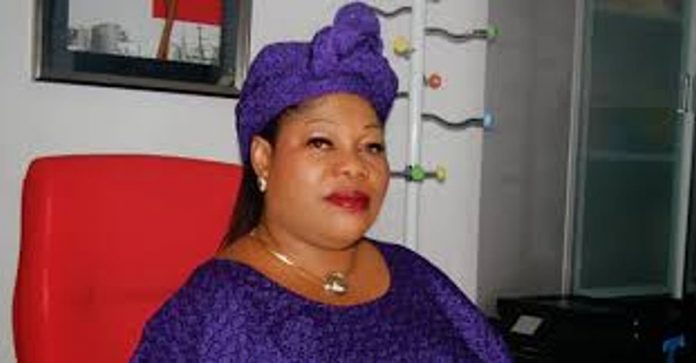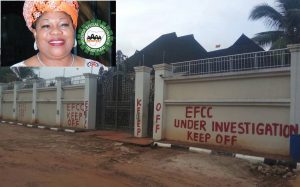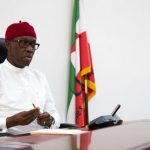...To get all news updates, Join our WhatsApp Group (Click Here)
Also Join our WhatsApp Channel (Click Here)
A Federal High Court in Abuja has granted an order of interim forfeiture in relation to 46 property including houses and parcels of land suspected to be owned by former Chairperson of the Board of the Nigeria Social Insurance Trust Fund (NSITF), Mrs. Ngozi Juliet Olejeme.
Justice Taiwo granted the order in a ruling on a motion ex-parte, marked: FHC/ABJ/CS/538/2020, argued on Tuesday by Ekele Iheanacho, a lawyer with the Economic and Financial Crimes Commission (EFCC).
Justice Taiwo ordered the EFCC to publish the order in a national daily to enable anyone who is interested in the affected property to show cause within 14 days why the assets should not be permanently forfeited to the Federal Government.
The judge fixed July 27 this year as the return date.
The 46 property, listed in documents filed in court, are said to be located in Abuja, Bayelsa and Delta states.
The EFCC claimed, in a supporting affidavit, that Olejeme acquired the said property with public funds she allegedly diverted while serving in the NSITF between 2009and 2015.
One of the property is identified as N0: 2 Kainji Crescent, off Lake Chad Crescent, Maitama, Abuja (also known as Plot 738 Cadatral Zone AO5, Maitama, Abuja, the which the EFCC claimed she acquired in 2012 at N1.3billion.
The EFCC alleged that Olejeme acquired the property using funds received as kickbacks from contractors, through third parties.
It stated that “During Mrs. Olejeme’s tenure as aforestated, she collected a cumulative sum of USD $48, 485,127.00 from Chuka Eze (her Account Officer in First Bank Plc), Henry Sambo Ekhasomi (the Director of Finance of NSITF), Aliyu Zubairu (Director of Corporate Affairs -NSITF), Adebayo Aderibigbe and Abubakar Umar.
“The said sum of USD $48, 485,127.00 represents the dollar equivalent of kickbacks paid to BDC (bureau de change) by contractors/consultants of NSITF on Mrs. Olejeme’s instructions as well as payments to the BDC operators directly from NSITF account.
“The personal account of Mrs. Olejeme in First Bank Plc also received a total in-flow of N22, 200,000.00 from Hybrid Investment Advisors Ltd, a contractor to NSITF.
“Excellent Solicitors & Consultants is one of the firms engaged by the NSITF as consultant.
“In the course of time, the firm received over N1,000, 000, 000.00 from the NSITF under the guise of rendering consultancy services, its proprietor Max Ozoaka withdrew the monies and either gave same in cash to Mrs. Olejeme or did transfer to her proxies under her instructions.
“Within the same period, the sum of N5, 984,059,110 was paid by NSITF under the guise of consultancy services to Fountain Legal Services and Fountain Media Consults being the firms owned by Adebayo Adebowale Aderibigbe (a staff of NSITF).
“As the said payments were made by the NSITF to his firms’ accounts, Mr. Adebayo Adebowale Aderibigbe gave Mrs. Olejeme a total cash sum of N505,000,000.00 and US$11,488,550.00 in dollars.
“Mrs. Olejeme procured the services of bureau de change operators through Mr. Chuka, who provided the bank accounts of the BDC operators to her.
“Several consultants/contractors to NSITF transferred money to the bank accounts of these BDC operators in naira for Mrs. Olejeme while the dollar equivalent of each naira lodgment would be collected by Mr. Chuka and handed over to Mrs. Olejeme in her house or through bank transfers.
“Mr; Chuka was interviewed on various dates including 23rd August, 2016, 19th December, 2016, 4th April, 2017, 2nd May, 2017, 17th July, 2017 19th December, 2017, 27th December, 2017 and 17th May, 2018 and he consistently narrated the details of the numerous United States dollars he couriered to Mrs. Olejeme as well as other financial dealings he carried out for her.
“The BDC Operators which provided the currency exchange services for Mrs. Olejeme through Mr. Chuka include Majia BDC, Alim BDC and Ashanbrak .BDC.
“In addition to giving the currencies to Mr. Chuka for Mrs. Olejeme, there were occasions where the BDC Operators transferred some of the funds directly to Mrs. Olejeme’s controlled bank accounts.
“For instance Mrs. Olejeme received the sum of N350,000,000.00 from the BDCs into her private company Able Jes Nigeria Ltd’s account in GTBank Plc in two days i.e (29th and 30th April, 2013).
“In fact on 29th April, 2013, only Adamu Musa of Majia BDC made cash deposits into the same account totalling N236,350, 000.00. She (Mrs. Olejeme) is the sole signatory to the said account.
“Mrs. Olejeme used the huge funds referred to in the foregoing paragraphs, which funds did not form part of her lawful income, to acquire property referred to.
“She used third parties in making payments for all the property so as to conceal and or avoid the properties/funds from being easily traced directly to her.
“Mrs. Olejeme hired the services of one Mr. Ifeanyi Njokanma, who is a property manager to purchase and acquire, on her behalf, most of the property,” the EFCC said.
You can get every of our news as soon as they drop on WhatsApp ...To get all news updates, Join our WhatsApp Group (Click Here)
Also Join our WhatsApp Channel (Click Here)


















